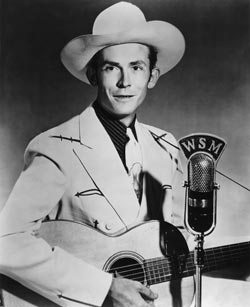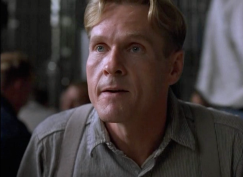This week’s theme is…Falsetto Bros! It’s good to be a man 🙂 Male singers possess a major difference in comparison to females: a falsetto range. It’s like a magical third zone of vocal timbre that allows men to soar like chirpy birds above their more commonly used tenor and baritone registers. I love to sing in my falsetto register. I often experience an enchanting and lyrical freedom up there that I don’t experience in the lower tessituras. Across the years, and in different musical cultures, many male singers have discovered the same thing, and have worked to cultivate performing voices through their falsetto ranges, often grappling in some way to reconcile their masculinity with the feminine associations of their chosen (or determined) voice. This week we look at some such gentlemen.
Falsetto Bros, Day 3 – Lovesick Blues by Hank Williams

One of my favorite movies is The Shawshank Redemption.
Have you ever seen it? It’s not the kind of movie you would watch every month (if you have time for that anyway – I really don’t these days!), or even every year. But if you know the movie, then you understand that it’s the kind of film that strikes you with a strong urge to immerse yourself in it every now and again. And you have to make time and space for it; it’s a long movie and a captivating one, so you won’t want to have to stop it in the middle and risk interrupting the flow and sweep, which is considerable and absorbing. In my opinion, it’s a rare example of an excellent and polished movie to result from an adaptation of a Stephen King story – there are a few classic films in that body of films; more often I find they feel cheap and hollow. But The Shawshank Redemption really soars. It follows the story of Andy Dufresne, played by Tim Robbins, a successful banker who is wrongly convicted of murder and incarcerated in a state prison for the better part of his life. Not content to let prison existence destroy his spirit, he steadily resolves to live life on his terms and effect a spiritual transformation within the prison on the inmates who surround him. One of Andy Dufrense’s proudest accomplishments along his path of renewal is the construction of an aesthetically edifying and resource-rich prison library in the early 1950s which results from his repeated nagging of the state’s prison board to release funds to make it possible.
The new library is beautifully decorated and contains volumes of literary and musical works. One of the most endearing characters in the film is Heywood, played by William Sadler.

He’s a lovable career criminal, resigned to living out his life sentence as happily as possilble, dim but sincere. And he’s a country music fan. His favorite part of the new library is the listening stations, complete with turntables and Hank Williams records.
Heywood is the one who comically mispronounced “Alexandre Dumas”. I can’t find it on YouTube, but there’s a really charming scene in which he is kicked back in the new library, enjoying the record collection and unselfconsciously singing along to Hank Williams’ 1949 recording of Lovesick Blues, complete with the yodely changes in register. Here’s the song:
Pretty cute little number isn’t it? It was written in the 1920s and has been covered and recorded by a generous handful of country greats, most recently by George Strait in this super clean, muscular 1992 production, a full 70 years after its genesis:
Every recording I’ve found, whether made by man or woman, country artist or otherwise (most of them are country, but there is a also fun one by Jerry Lee Lewis), preserves the yodeling tucked into the vocal line. The very first recording, sung by the minstrel performer Emmet Miller, also contains yodeling:
So, where did that come from? This yodely style of singing, the constant flirting with the break beyond which lies the falsetto range, is a consistent mark of style that has pervaded American Country and Western music over the course of its century or so of development. Maybe you could see that as ironic: a style of music that revels in machismo and masculinity, so significantly colored by cowboy culture, is one that mixes the effeminate male falsetto register so freely with the manlier chest voice. Or maybe we have it wrong, and it’s time to reclaim the male falsetto voice for the masculine call that it truly is. I would be inclined to agree more with the latter. I often notice when I lead college music students, especially underclassmen, through scale singing exercises they are reluctant to cross the break and sing out in their falsetto registers, even though it makes certain keys much easier to master. But it’s truly a male birthright, and man should embrace it as the Country and Western singers demonstrate!
Early Country and Western singers had absolutely no hesitation to cross their breaks and incorporate their falsetto registers into their singing. The hundred year history of American Country Music is, at this point, dense with names and influences. Largely a twentieth century genre, Country Music’s “generations”, each lasting roughly two decades, span the century, each one shaped largely by the political events, recording technology and commercial marketing systems of the years it occupied.
The First Generation, working during the 1920s, was the first to make a sizable dent in the development of Country music. The influences inherited by these singers, who inhabited the American South, were a veritable hodgepodge which included blues, Appalachian folk songs, negro spirituals, Protestant hymns, backwoods fiddling tunes, work songs, cowboy songs, and more. One of the first major figures to meld many of these influences into a distinctive personal voice was Jimmie Rodgers. In the summer of 1927 he and several other early country singers were recorded in Bristol, Tennessee by Ralph Peer, a producer for the Victor Talking Machine Company, who was traveling through the south in search of new talent. These “Bristol Sessions” gave birth to the American Country music industry as we know it, and all successive generations are able to trace their origins back to this event in some way. Here is Jimmie Rodgers singing “Sleep, Baby Sleep” as recorded in by Ralph Peer during July of 1927 in Bristol Tennessee:
Did you hear his cowboy yodel? Almost every recording of Jimmie Rodgers I’ve found features him yodeling like that, in a slow, relaxed drawl. I’m not sure if that would soothe me to sleep, but it’s a lovely trademark.
If you want to get a sense of the American South that incubated all of the styles that influenced the early country singers, albeit a stylized one, check out the film O Brother, Where Art Thou?, the Cohen Brothers’ colorful adaptation of Homer’s Odyssey.
It even features a scene that is roughly analogous to the landmark Bristol Sessions:
The second generation of Country singers saw cowboys like Roy Rogers and Gene Autry in the 1930s and 1940s. They could yodel too and used the skill to paint a romantic picture of cowboy life to American audiences.
Hank Williams comes right toward the end of this second generation. What I notice with Williams is that he works the yodel into the song proper, rather than breaking into yodeling episodes between the verses like his predecessors. Williams would set the tone for decades of country music that followed with its tendency to flip back and forth between registers, often within the same phrase. Here is a much more recent country performance, actually a cover of 1960s Doo-Wop, that illustrates this tendency:
Now, not all of the Country greats were yodelers. The greatest figure of the 3rd Generation, Johnny Cash never did it. And if you know Johnny Cash you probably can’t really imagine him doing it. Even when he covered the tunes of natural natural yodelers like Jimmie Rodgers, his yodeling is a bit half hearted. Sure, he gets the syllables right, but he flat out refuses to cross his vocal break.
So, I guess it yodeling necessarily universal to Country singers, but certainly very common.
I find the phenomenon of constant male falsetto singing in Country Western music paradoxical. The male falsetto range has, for centuries, seemed to be a mark of weakness, sensitivity, femininity, but for its entire history, the singers of Country music have managed to make this every present expressive technique just the opposite, incorporating it into a larger package of rugged masculinity.
—
Would you like this featured track in your own personal collection to listen to anytime you want? Support the Smart and Soulful Blog by purchasing it here:
Or purchase the whole album, an exceptional value, here:
Want to listen to the entire playlist for this week and other weeks? Check out the Smart and Soulful YouTube Channel for weekly playlists!
Do you have feedback for me? I’d love to hear it! E-mail me at smartandsoulful@gmail.com
Do you have a comment to add to the discussion? Please leave one below and share your voice!
Subscribe to Smart and Soulful on Facebook and Twitter so you never miss a post!




[…] Falsetto Bros, Day 3 – Lovesick Blues by Hank Williams […]
LikeLike